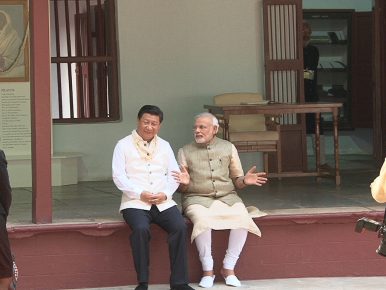By Ankit Panda
 Indian Prime Minister Narendra Modi will meet Chinese President Xi Jinping for an unofficial bilateral summit on April 27 and 28, the two countries announced on Sunday. The meeting will take place in Wuhan, in China’s Hubei province. The sudden announcement of this kind of an unprecedented meeting between the leaders of these two countries was announced after a trip by Indian External Affairs Minister Sushma Swaraj to China to meet with her Chinese counterpart Wang Yi. A Modi trip to China had long been rumored amid reports of Indian attempts to “reset” bilateral relations with China, but the announcement for an end-April summit is especially quick. The Indian prime minister will also travel to China in June, for the Shanghai Cooperation Organization’s security summit.
Indian Prime Minister Narendra Modi will meet Chinese President Xi Jinping for an unofficial bilateral summit on April 27 and 28, the two countries announced on Sunday. The meeting will take place in Wuhan, in China’s Hubei province. The sudden announcement of this kind of an unprecedented meeting between the leaders of these two countries was announced after a trip by Indian External Affairs Minister Sushma Swaraj to China to meet with her Chinese counterpart Wang Yi. A Modi trip to China had long been rumored amid reports of Indian attempts to “reset” bilateral relations with China, but the announcement for an end-April summit is especially quick. The Indian prime minister will also travel to China in June, for the Shanghai Cooperation Organization’s security summit.
Rather than focusing primarily on the bilateral relationship, however, the visit will reportedly focus more on global and regional issues. In this sense, the summit recalls the 2014 meeting between former U.S. President Barack Obama and Xi at Sunnylands in California — that meeting also provided the two leaders with an informal setting in which to discuss their understandings of global issues broadly.
In 2017, India and China were mired in a 72-day border standoff on a piece of territory disputed between Bhutan, India’s ally and traditional partner, and China.
That standoff at Doklam reached a “disengagement” just in time for Modi to meet Xi on the sidelines of the BRICS summit, which China was hosting at Xiamen.
Earlier, before the Doklam standoff, India made clear its opposition to parts of China’s Belt and Road Initiative, especially the China-Pakistan Economic Corridor. New Delhi declined an invitation to participate in the inaugural Belt and Road Forum in Beijing in May 2017.
In 2016, as India pursued membership in the Nuclear Suppliers Group, its bid was held back by China, which refused to lend its support. The two countries have also been at loggerheads over what New Delhi sees as China’s willingness to provide cover to Pakistan at the United Nations.
Other issues, including Himalayan water rights, the Dalai Lama, and decades-old border disputes, have also deviled bilateral ties in recent years. On global issues, however, including global governance and climate change, India and China share more commonalities.
Framing Modi’s upcoming trip, Swaraj said that the India-China relationship “flows from the understanding reached by the two leaders last year that India-China ties are a factor for stability in a period of global changes and have a common responsibility for peace, security and prosperity in the world.”
“The two countries have no choice other than pursuing everlasting friendship, mutually beneficial cooperation and a common development,” Wang said, echoing Swaraj’s observation.
Despite this rhetoric, with numerous outstanding issues and competing global visions — Modi is attracted to the “free and open Indo-Pacific” concept that is now also being championed by Japan, Australia, and the United States while Xi sticks to China’s Asian security concept — it’s unclear if the two leaders will manage to voice a common vision after their meeting.
No comments:
Post a Comment